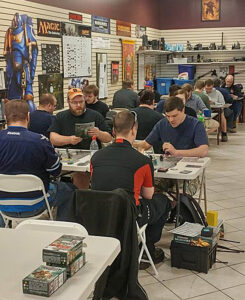Comix Zone Celebrates 30 Years in Business
North Syracuse business, one of a few of its type in CNY, marks milestone
By Joe Sarnicola

Greg Van Camp, 55, opened Comix Zone, which sells comics, toys and games, in November 1995. This year the store located in the Maines Plaza in North Syracuse is celebrating its 30th anniversary.
Comix Zone is the oldest comic bookstore still owned by the same person in the area. The first comic bookstore in the Syracuse area was Dream Days, which opened in the early 1970s, but closed in 1999 after changing owners. The Comic Shop in Oswego opened in 1992, but has also recently changed owners.
“I opened up my store at a horrible time,” Van Camp said. “Large print runs of titles were being published and speculators were buying multiple copies. Then that bubble burst. Other stores started closing. Since I didn’t have the overhead that they did, somehow I was able to build my business.”
When asked why he opened a comic bookstore as opposed to any other, he gave his father partial credit.
“My father collected everything. Coins, stamps, CDs, toys, comics. I collected comics when I was younger, then got away from them when I was a teen,” he said. “In the early 1990s, a friend and I talked about opening a comic store together. He backed out. I opened the store on my own.”
Van Camp ran that store for about 10 years until moving into his current location — literally across the street from the original site.
In order to prevent himself from trying to buy too many comics for his own collection, he said, “I told myself I couldn’t collect once I opened the store, otherwise I would be keeping things I should be selling.”
But that hasn’t stopped him from buying the occasional collection. He bought the entire comics inventory of Twilight Books and Games in Syracuse when that store closed about 25 years ago. Someday he said he may actually have time to go through those boxes of books and grade them and sell them.

COVID-19 had a devastating effect on the comics industry. Diamond Comics Distributors, the main distributors of comic books, lost the accounts of Marvel, DC and other smaller publishers who found other ways to distribute their books. The company has since filed for bankruptcy. Plus, Comix Zone was temporarily closed to the public. Any books that did arrive had to be brought out to the customers in the parking lot by store staff until the pandemic restrictions were lifted.
Van Camp managed to navigate his business through that difficult time. Now he has to deal with multiple distributors rather than just one.
“We are considered a high-volume store, placing in the top 300 stores in the country,” he said.
Comix Zone offers online shopping through its website, comixzone.com, as well as through eBay, Amazon and of course in-store sales.
“Thirty years ago, comics were considered geeky, but now because of so many superhero movies, they’re considered a part of popular culture,” he said.
He has three employees. Two have been with him for many years. Matt Terry said, “I’ve been here for 18 years. I enjoy getting to know the customers. Some, who were kids when I started here, are grown up now. They still come here as adults. We get customers of all different races, ages, genders. It’s why I like working here.”
Q Spicer is the newest employee, having been with the store just over a year, after moving to Central New York from Maryland. Mike Longo has been with the store for 19 years. He worked in the gaming industry before he started at Comix Zone. He’s also an artist. Some of his hand-painted gaming figures are on display by the checkout counter. The store has a large selection of games and accessories. There’s a section devoted to gaming play. Open plays of Warhammer 40,000 are one of the most popular draws on Thursday nights, attracting players, people painting or building sets and spectators.
The gaming area has recently been renamed. Van Camp posted this notice on the store’s Facebook page in July. “Back at the end of June, Comix Zone suddenly lost a very close friend. Abraham T. Sales was one of the Warhammer 40,000 gamers. He was either playing a game, building models or just hanging out. We are naming the gaming area in the store after him. It’ll be called the Abraham T. Sales Gaming Area. Or as some like to call it, The Hammysphere.”

In the 1940s, when comic books first appeared on the market, they were sold in newsstands, drugstores and mom and pop shops. The first stores devoted primarily to comic books and related materials opened in the late 1960s to serve customers who wanted to save the books as collectibles and who were looking for important “key” issues, such as first issues of a title or the first appearance of a popular character.
Taking advantage of these new outlets, new comic companies and titles were published, selling directly to these stores rather than to newsstands. These books were sold to the stores with a deeper discount under the terms that they could not be returned to the publisher, which was the case with newsstand comics. This new method of distribution was called the direct market. Many new comic shops opened across the country.
But the comic industry has had to adapt to changes in supply and demand and over-publication of certain titles combined with the loss of individuals buying multiple copies thinking the investment would pay off, caused many stores to close. A new concept, the graphic novel, was introduced. A graphic novel is a longer story told in comic book form or a collection of previously published comic stories packaged as a magazine-sized book. This created competition as these were sold in traditional bookstores as well.
Like any other industry, online shopping reduced the need for customers to visit actual stores, putting further pressure on any remaining stores to either diversify or close. In 2002, in an effort to promote comic books and comic shops, comic publishers began a collaborative effort to distribute free comics only to comic shops on the first Saturday in May, which the shops then give to their customers. Free Comic Book Day is still one of the busiest days of the year for most comic shops, which they usually combine with sales and other incentives.
Van Camp hasn’t yet finalized his plans to celebrate 30 years in business. He said it may be a gradual process with sales, promotions and other incentives throughout the year.
“Comics have survived the digital transition that has hurt other industries because of their collectability,” he said. “I created a store that’s extremely successful.”
He isn’t afraid to share some of his success with local charitable organizations. He’s donated to Onondaga County Public Library’s SYR Reading Runway program, as well as to animal welfare groups such as Helping Hounds Dog Rescue.

